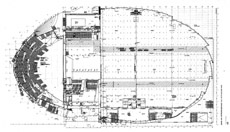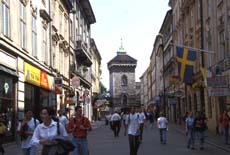Agoras ?

A contemporary public/private agora, the exposition space at Euralille -- Plan reproduced by permission of Office for Metropolitan Architecture.

Florianski Street, Krakow
The agora in Athens, far from being architecturally impressive, was a jumble of crowded downtown streets and irregular open spaces where shrines and altars, public buildings and monuments stood in the midst of workshops, market stalls, and taverns. . . .
Aristotle, who thought of the agora chiefly as a place for discussion and the exchange of ideas, described in The Politics his ideal public square: All commercial activities and all merchants and vendors were to be exiled to another part of town. "Nothing here [in the agora] may be bought or sold, and no member of the lower order may be admitted unless summoned by the authorities. . . . The market proper, where buying and selling are done, must be in quite a separate place, conveniently situated both for goods sent up from the harbor and for people coming in from the country." Jackson 1984, 17